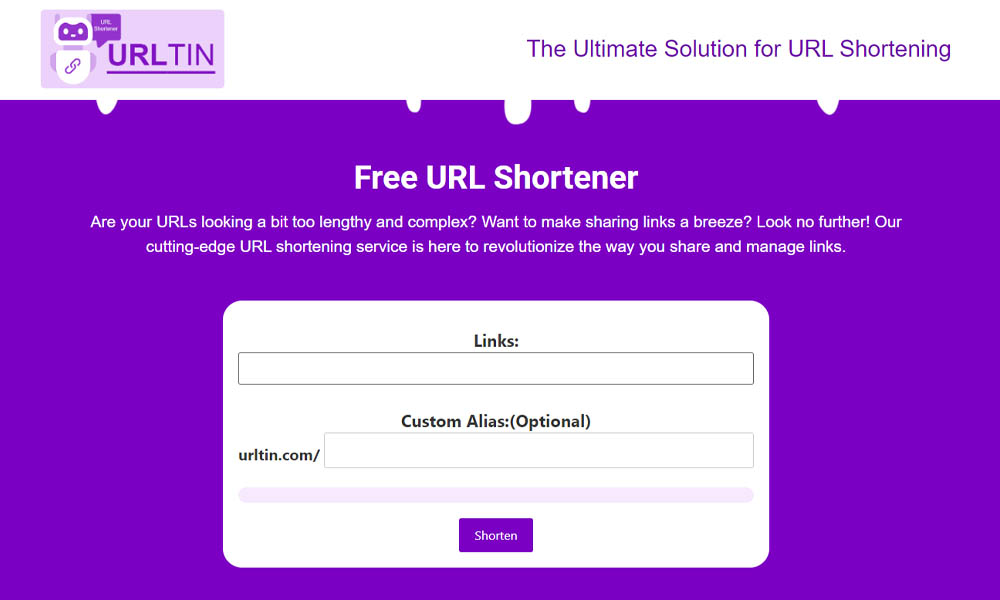In the realm of digital marketing and search engine optimization (SEO), every element of your online presence plays a pivotal role in determining your success. One often overlooked but essential aspect is the URL structure of your web pages. A well-structured URL not only aids in user experience but also significantly impacts your site’s SEO performance.
In this blog, we will delve into the crucial components that contribute to a well-structured URL, and how paying attention to these details can enhance your website’s visibility and ranking. Plus, we’ll introduce you to a handy tool, URLTin – a Free URL Shortener, which can simplify your URL management.
1. Clarity and Relevance
A well-structured URL should provide an immediate understanding of the content of the page. It should be concise, descriptive, and relevant to the topic of the page. Including relevant keywords in the URL helps search engines and users quickly identify the content. For instance, if your page is about “10 Tips for Healthy Eating,” a URL like “www.example.com/healthy-eating-tips” is much clearer than a generic one.
2. Use of Hyphens
Hyphens are recommended over underscores when separating words in a URL. Search engines recognize hyphens as word separators, which makes it easier for them to parse the words in your URL. For example, “www.example.com/summer-vacation-tips” is more search-engine-friendly than “www.example.com/summer_vacation_tips.”
3. Short and Sweet
While it’s essential to include relevant keywords, it’s equally important to keep your URLs short and concise. Long URLs can look cluttered and might deter users from clicking on them. Moreover, search engines typically truncate longer URLs in search results, potentially omitting crucial information. Strive for a balance between including keywords and keeping the URL length reasonable.
4. Avoid Dynamic Parameters
Dynamic parameters, such as question marks and equal signs, often accompany URLs with query strings. These URLs are typically generated by content management systems and can be complex and confusing to both users and search engines. Instead, opt for static, readable URLs that convey the page’s content without unnecessary parameters.
5. Canonicalization
Canonicalization refers to selecting the preferred URL when multiple URLs lead to the same content. Search engines might treat different URL variations as separate pages, leading to duplicate content issues and potential SEO penalties. Set a canonical URL to indicate the preferred version and consolidate link equity.
6. Secure with HTTPS
Security is a crucial factor in SEO. Using HTTPS in your URL (e.g., “https://www.example.com”) encrypts the data exchanged between users and your website, enhancing user trust and search engine rankings. Google also considers HTTPS as a ranking signal.
Introducing URLTin – Free URL Shortener

Managing URLs effectively is a crucial aspect of maintaining a well-structured website. Introducing URLTin, a Free URL Shortener tool designed to simplify your URL management while maintaining the principles of good URL structure. With URLTin, you can create short, branded, and memorable URLs for your content, making it easier to share on social media, in emails, and across other platforms. The tool also provides click tracking and analytics, helping you understand the performance of your shared links.
FAQ: Understanding the Importance of Well-Structured URLs for SEO
What exactly is a well-structured URL?
A well-structured URL is a web address that is designed to be clear, concise, and relevant to the content of the webpage it represents. It includes essential keywords, uses hyphens to separate words, and avoids unnecessary dynamic parameters.
Why is a well-structured URL important for SEO?
A well-structured URL provides several benefits for SEO. It helps search engines understand the content of the page more accurately, improves click-through rates from search results, reduces the risk of duplicate content issues, and enhances user experience, all of which contribute to higher search engine rankings.
Can I change my existing URLs to follow the best practices?
While it’s possible to update existing URLs, it’s important to approach this task with caution. Changing URLs without proper redirection can lead to broken links and loss of search engine ranking. If you’re considering URL changes, it’s recommended to consult with an SEO professional to ensure a smooth transition.
How do I create a short URL using URLTin?
Creating a short URL with URLTin is simple. Visit the URLTin website, paste the long URL you want to shorten, and click the “Shorten” button. URLTin will generate a shortened version of your URL that’s easier to share and manage.
Does URLTin offer any analytics for the shortened URLs?
Yes, URLTin provides click tracking and analytics for the URLs you’ve shortened. You can gain insights into how many times the link has been clicked, the geographical location of the users, and the devices they used. This data can help you measure the performance of your shared links.
Can a well-structured URL improve my website’s user experience?
Absolutely! A well-structured URL not only aids search engines but also enhances user experience. A clear and descriptive URL gives users an idea of what to expect when they click the link, which can increase their trust in your content and make them more likely to engage with it.
Are there any specific industries that benefit more from well-structured URLs?
Well-structured URLs are beneficial across all industries. Whether you’re running an e-commerce store, a blog, a news website, or any other type of online presence, having URLs that are clear, relevant, and user-friendly will always improve your SEO and user engagement.
How often should I review and update my URLs for SEO purposes?
It’s a good practice to review your URLs periodically, especially when making significant content changes or restructuring your website. Regularly auditing and optimizing your URLs can help ensure that they remain aligned with your SEO goals and the evolving landscape of search engine algorithms.
Does using HTTPS in my URLs really impact SEO?
Yes, using HTTPS is considered a ranking signal by Google. Secure websites with HTTPS are favored over their non-secure counterparts in search engine rankings. Additionally, HTTPS enhances user trust by encrypting data exchanged between users and your website.
Is there a way to revert back to a previous URL structure if changes negatively affect my SEO?
If you’ve made URL changes that negatively impact your SEO, it’s possible to revert back, but it should be done with careful consideration. Implement proper 301 redirects from the new URLs to the old ones to preserve search engine rankings. However, it’s always best to consult with an SEO expert before making such changes.
Remember that URLs are a foundational element of your website’s SEO strategy. By understanding and implementing the principles of a well-structured URL, and utilizing tools like URLTin, you can set the stage for improved search engine visibility and a more user-friendly online presence.
Conclusion
In the ever-evolving landscape of SEO, every optimization counts. A well-structured URL might seem like a minor detail, but it can have a significant impact on your website’s visibility and ranking. By adhering to the principles outlined in this blog and utilizing tools like URLTin – Free URL Shortener, you can ensure that your URLs contribute positively to your SEO efforts. Remember, a well-crafted URL not only aids search engines but also enhances user experience, making it a win-win for your website’s success.

